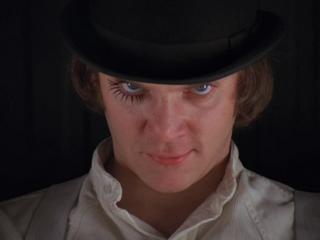There are several different types of adaptation. The most common approach assesses the film's faithfulness to the original text. How many scenes and characters are included? Do the characters resemble the author's descriptions of them? How much dialogue is included from the original text? In this reading the original text casts a shadow over the film; everything is viewed in how it relates to the book. Inevitably the film comes off second-best to the book.
 |
| 'There was me, that is Alex, and my three droogs,' |
 For adaptations of stageplays, the space the story plays out in is the greatest change. In film you can put your characters in any setting you want and make it look realistic. You can move from a tiny cramped room to outer space (sometimes in the same shot). On stage you are limited to the space of the stage, and dialogue is often used with scenery to represent the setting.
For adaptations of stageplays, the space the story plays out in is the greatest change. In film you can put your characters in any setting you want and make it look realistic. You can move from a tiny cramped room to outer space (sometimes in the same shot). On stage you are limited to the space of the stage, and dialogue is often used with scenery to represent the setting. |
| “Were I to fall in love, indeed, it would be a different thing; but I have never been in love ; it is not my way, or my nature; and I do not think I ever shall.” |
For me, the most interesting adaptations of novels or plays presents a particular reading of the text. This doesn't mean an academic reading, but rather one that follows a particular theme, or chooses one genre to pursue (focus on the drama, comedy, romance, etc.). Because novels tend to have far too much material to include in a film (or even a series of films), the screenwriter, producer, and director have to make choices about what and what not to include. If the filmmaker is serious about making a cohesive film, the choices must be based around the chosen theme or emotion. An example of such choice is the Harry Potter films: the detail about everyday life at Hogwarts, homework, exams and classes, were largely excised from the finished films. They were only included when they provided information essential to the Voldemort/Harry plot. As a result the books feel darker and more serious than the novel, which have episodes and B-plots that provide comedy.
Filmmakers should heed the advice of Orson Welles, a prolific adaptor: 'you must say something new about a book, otherwise it is best not to touch it.'
How do you approach screen adaptations? Are you a purist or an anarchist (or somewhere in the middle)?
*Denise Faithfull (with Brian Hannent), Adaptations, Currency Press: Sydney, c2007.
No comments:
Post a Comment